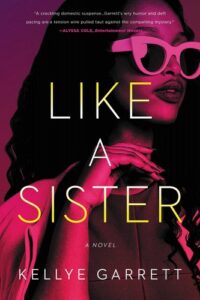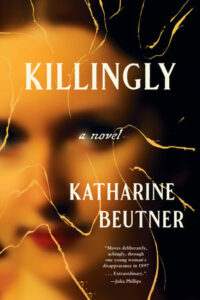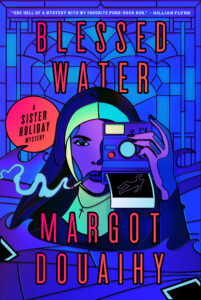In the labyrinthine world of crime fiction, few elements stir the plot’s pot as effectively as sibling bonds. The mercurial relationships between sisters and brothers carry lifetimes of camaraderie, shorthand, grudges, tiny triumphs, and shared histories. They can be crucibles for narrative tension and foundations for epic plot twists. I believe that when siblings are centered in mysteries—particularly those interested in intersectional feminism and queer and trans identities—the narrative stakes feel amplified and nuanced. These four novels show us how sibling relationships can be much more than backdrops or backstories in crime fiction, supercharging narratives with primal terror and emotional range.

Oyinkan Braithwaite’s narrative is a case study in scalpel-sharp dark humor, inventive scene work, and sisterhood reimagined. The bond between sisters Korede and Ayoola is constantly tested, not by quotidian squabbles, but by a string of boyfriends who end up dead (murdered in cold blood, in fact). Braithwaite keeps this tensile book alert with vital questions of loyalty and survival, threading gender and societal commentary into an incredibly tight ripper. The novel doesn’t just entertain, which it absolutely does; it dissects the very essence of “sisterly duty,” drenching a crime narrative with resonant explorations of PTSD, where and how trauma is stored in the body, and complex ethical decisions. I teach this book in my “Plotting the Perfect Crime” course, a plot-centric crime writing class at Emerson College; it’s illuminating to see how the MFA students celebrate the novel’s fine-tuned craft, confident plotting, emotional wreckage, humor, and creative quotient. I love books that offer a dialect—asking how two apparent opposites are simultaneously true? This narrative is distinct in its ability to balance withering satire with poignant insights into the love and sacrifice of sisters who just want to survive and thrive in an unfair world.

Buckle up. Gillian Flynn’s Dark Places is a visceral journey through the lacerating understory of memory, pain, and perception, where the inimitable Libby Day and her incarcerated brother, Ben, navigate the aftermath of their family’s brutal massacre on a Kansas farm. Libby was the only survivor of the wretched mass killing, and Ben’s been locked up for the crime for more than 20 years. Flynn’s craftsmanship in a nonlinear structure, multiple PoVs, and astonishing character depth transforms this sibling story into a gutting exploration of truth and reconciliation. The tension is palpable.The humor is a tonic. The pace is addictive. The writing writhes with dark poetry. The threat and promise of sibling understanding charge this book. Though Libby and Ben Day build all sorts of armor to deny it, the siblings are so desperate to be seen and feel a sense of belonging. I’ve honestly never read anything like this or felt how something so dark could be so sublimely beautiful. Bonus: Gillian Flynn will be showrunning and adapting Dark Places as a streaming series for HBO. Anyone who saw HBO’s revelatory adaptation of her brilliant Sharp Objects is eagerly counting down the days for this one.

Kellye Garrett’s Like a Sister is a gold-standard. This sensational mystery rages with wisdom, heart, wit, exceptional plotting, and urgency. The novel is centered around Lena Scott’s quest to unearth the truth of the awful death of her half-sister’s death, Desiree Pierce, a reality TV star who was found dead in a playground. Garrett brilliantly juxtaposes Lena’s personal quest with a broader commentary on media’s insidiousness, race, and societal occlusions, crafting a narrative that’s as exigent and alert as it is gripping. The sibling dynamic here is the guiding force that drives the story through grief, deception, and injustice. It’s electrified by the spirit of women bound by blood and driven by a hunt for truth. Like a Sister defines the contemporary mystery canon; it is a must-read for every crime fiction fan.

In Katharine Beutner’s richly lyrical and indelible tale of family duty, friendship, societal pressures, and pain, we’re transported to the bracing Massachusetts of 1897. Bertha Mellish, “the most peculiar, quiet, reserved girl” at iconic Mount Holyoke College, goes missing. As a search team searches the pond where Bertha might have drowned, her panicked sister Florence and her father try to find her. Amidst the chaos and fear is Agnes, Bertha’s closest friend, whose intellect and solitary nature mask her own turbulent emotions. As a student of medicine (rare for women back then), Agnes is no stranger to the clinical dissection of facts. So why is she reticent to share info with Florence or the PI hired by the family? Florence is determined to crack the facade and find her sister before it’s too late. But will she? And how well can we ever truly know a sibling or their truth?

Queer sibling questions fuel the storm of Blessed Water, a novel I wrote as a blistering sequel to Scorched Grace, the first book in the Sister Holiday Mystery series with Gillian Flynn Books/Zando. Blessed Water is a sibling study within a ticking-clock mystery told in three suspenseful acts—Good Friday, Saturday, and Easter Sunday. I wanted to add another line of inquiry to the queer storytelling ecosystem that I started with Scorched Grace, and I gave Blessed Water a unique cadence and different suite of obsessions. The story opens again with Sister Holiday, who remains a punk, queer, chain-smoking nun. But she’s also apprenticing the wry Maggie Riveaux at the newly formed Redemption Detective Agency, one step closer to her dream of becoming a private eye. When Sister Holiday sets out to meet their first client, she finds the slashed up body of a priest floating in the Mississippi River. The very same morning that Holiday pulls the body out of the water, a terrible storm gathers strength and Holiday’s brother, Moose, an army medic, mysteriously shows up in New Orleans. Moose is tightlipped about his sudden appearance. What’s he hiding? Or whom? As she tries to piece together the clues and track down the murder, Sister Holiday grapples with her grief and distrust of her brother, and her role in his dismantling. Holiday was the lesbian older sister who could have helped her gay younger brother find his way, but she didn’t. Can she heal the past by changing the future? Or, are old sibling dynamics fixed and cycles of violence destined to repeat?
***
These are just a small sample of the many crime narratives invested in complex and idiosyncratic sibling relationships. They show how inherent family drama and emotional friction can amplify tension and enrich the thematic development. From the brilliant and macabre twists in Braithwaite’s work to Flynn’s darkly luminous character studies, the sibling bond is a formidable force. The ties that bind can be as potent as any dredged secret or hard-won revelation.
–Featured image: Caino e Abele, Titian, 1543–1545

















